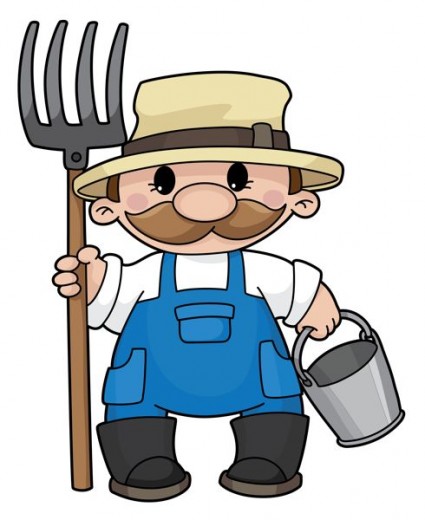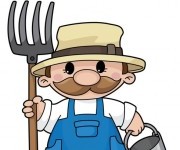 Is this really what farmers look like? Our culture abounds with images of farmers. Sadly, many of them are insulting. Stereotypes tell us that farmers are male, white, uneducated, dirty, backwards-thinking, and talk with a funny accent. Farmers don’t get off the farm much, they like chewing on the ends of long stalks of grass, they wear overalls, and they have large wives named Helga and lots of children.
Is this really what farmers look like? Our culture abounds with images of farmers. Sadly, many of them are insulting. Stereotypes tell us that farmers are male, white, uneducated, dirty, backwards-thinking, and talk with a funny accent. Farmers don’t get off the farm much, they like chewing on the ends of long stalks of grass, they wear overalls, and they have large wives named Helga and lots of children.
If you don’t believe me, do a Google image search for “farmer.” The cartoons are especially instructive on how society views farmers.
Collectively, we don’t think of farming as an occupation for intelligent people. Smart people are doctors and lawyers, bankers, and professors. They don’t dig in the dirt, drive a tractor, or milk goats.
I say “we” even though until recently I would have counted myself outside of the influence of this social meme. And yet, when I asked myself this winter why I didn’t want to be a full-time farmer, I’m mortified to confess that one of the reasons that eventually came out was that I didn’t consider it to be an intellectually challenging or prestigious occupation.
I’m wrong to hold this opinion, but I also know I’m not alone. To change the way America eats, we need to change the way Americans view farming as an occupation.
Some farmers are among the smartest people I know. Many have gone to college, have master’s degrees and PhDs, and can discuss philosophy, science, politics, and religion with the best. Many are also active participants in democracy, advocating for policies that help them make a living and ensure the survival of their community and their occupation.
At the MOSES Organic Farming Conference in La Crosse, Wis., last weekend, I saw exactly how diverse farmers can be. There were people of all ages — from tiny babies to spry elders 86 years young and all ages in between. While the majority appeared white (though we shouldn’t assume ethnicity), I met African farmers and ate breakfast with Native Americans. One session I was in was simultaneously interpreted for a Hmong woman, and the keynotes were being simulcast in Spanish. There were passionate teens with years of experience and elderly beginners looking for their second (or third) career.
As I wandered through the array of farming workshops, I was reminded of all the subjects in which farmers must not only be knowledgeable but expert in. It is a list that could intimidate even the most intellectually capable: chemistry, math, communications, soil science, personnel management, systems thinking, physics, finance, customer relations, mechanics, plant and animal biology.
In addition to working harder than most, successful farmers must be keen observers and constant innovators. They have to think creatively and be humble enough to admit when something isn’t working. I can only speak for me, but I’m not sure I’d make the cut.
Of course, not all farmers are created equal. Any fool can stick a seed in the ground, especially with satellite-guided sprayers and tractors that operate themselves. But it takes a truly intelligent and conscientious farmer to make sure the soil, air, and water are all healthy enough to grow a crop 10 or 50 years from now.
What does it take to raise the prestige-factor of farming? I don’t have the definitive answer, so use the comments to toss ideas around. All of us can publicly and privately recognize how hard it is to farm land and grow food sustainably. Unfortunately, prestige is associated with money in our capitalist society, so paying farmers well (and without complaint) when they farm well is a responsibility for all conscientious eaters.



